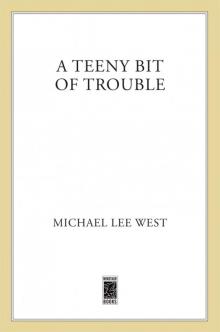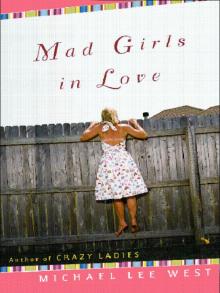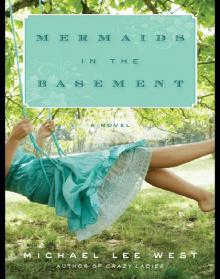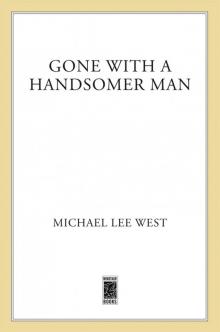- Home
- Michael Lee West
Gone With a Handsomer Man Page 6
Gone With a Handsomer Man Read online
Page 6
One boat cut in at an angle and sped toward the place where Coop had been. I ran down the bank and waved my arms, yelling at the boat. The church people ran out of the pavilion and began screaming, too. The boat sped up. Why didn’t the driver see or hear a shitload of Baptists waving and hollering?
Coop burst out of the water with the girl. The driver jerked the wheel. The boat veered away, sending up huge green waves. Coop and the girl floated up the edge of the swell, then slid down. He gripped her in a neck lock, keeping her face above the water.
The choir director waded in, but Coop was already kicking to shore. They laid the girl on the bank. Water rushed over her hair, pulling and fanning the damp brown strands over the pebbles.
She sat up and coughed while the choir director pounded her back. She burst into tears, hiccupping every other breath. Several of the church elders hollered out a few hallelujahs, then they went back into the pavilion.
Coop took my hand and led me back to the quilt. We flopped down. Water was beaded in his lashes. “What are you doing tomorrow night?” he asked. “And the night after that?”
We dated that whole summer. He ate supper with us every night, wolfing down second helpings of chicken-fried steak, mashed potatoes, red rice, and peach pie, though he later confessed that his favorite food in the world was egg salad sandwiches made with Duke’s Mayonnaise and lettuce, with a grind of pepper.
I wore garage-sale sundresses and dime-store panties that stayed on my body, despite long, intense necking sessions that steamed up the Mustang’s windows. Every night, on the oldies station, Elvis sang “That’s When Your Heartaches Begin.”
I thought mine were ending. Night after night, Coop’s hands squeezed my breasts, but never once slipped under my clothing. Then we’d come up for air and he’d draw his fingers across the fogged window. I ♥ Teeny.
Coop’s birthday, August ninth, fell on a Sunday. I asked Aunt Bluette if we could fix Coop a special supper. I didn’t want to be forward, so I waited for him to call. I didn’t expect to wait long, as he’d been calling every night. I baked a chocolate layer cake from scratch and decorated it with yellow icing sunflowers. I couldn’t decide if HAPPY BIRTHDAY COOP was proper or too ordinary, so I decided to just write COOP.
Aunt Bluette drove me to Walgreens, and I squatted by the cologne counter. I dithered between Brut Revolution, Hugo Boss, and Drakkar Noir. Finally I settled on Euphoria. I came home, set the gift-wrapped box on the counter, and waited.
Coop didn’t call. That Sunday I looked for him everywhere at church. I saw Dr. and Mrs. O’Malley sitting in the fifth row with Mrs. O’Malley’s parents. Aaron Fisher sat in front of me and tried to flirt, but I brushed him off. After the service, Aunt Bluette saw me staring holes at the O’Malleys. She offered to sneakily ask about Coop.
“Lord, no!” I whispered.
“Better to know than to wonder,” she said and started toward the O’Malleys.
I grabbed her arm and dragged her to the door. “I’d rather stick pins in my eyes,” I said.
The next morning, I was helping Aunt Bluette make squash pickles, when I glanced out the kitchen window. Coop’s Mustang drove down our long driveway, stirring up gravel dust. I yanked off my apron and ran to the bathroom, ignoring Aunt Bluette’s questions. I brushed my teeth and ran a comb through my hair. It was too late to change—I was wearing one of Mama’s old t-shirts that featured Elvis on the front and back.
I heard a knock and ran into the hall. Aunt Bluette beat me to it. She held open the door and smiled at Coop. “Come on in,” she said. “Just come on in. Teeny’ll be here directly.”
The minute I saw the pinched look on his face, I knew this wasn’t a social call. Still, I shut my eyes and made a quick bargain with Jesus. If He’d let everything be all right between me and Coop, I wouldn’t miss another choir practice.
I led Coop into the parlor and moved a heap of old newspapers. “Have a seat,” I said. “Would you like some iced tea?”
“Teeny, we need to talk.” He stood by the sofa but didn’t sit down. “I don’t know how to explain, but I can’t see you anymore.”
“Why not?” I sat down and tried to catch my breath. I could feel an attack coming on and couldn’t remember where I’d put my inhaler.
“Me and Barb got back together.” He shrugged. “I’m sorry.”
I nodded. Then I started wheezing.
“Teeny, you okay?” Coop asked.
I shook my head. No, I wasn’t okay. I’d never be okay. How could I have let myself care so much when he’d cared so little? I stretched out on the sofa, trying not to gasp. Aunt Bluette came running with my inhaler. She stuck it between my lips. “Breathe, Teeny,” she said and pushed the button.
I still couldn’t get air. She made me take another puff, then she turned back to Coop.
“Would you help me get her to the car?” she said to him.
I ended up spending the night at Bonaventure General Hospital, hooked to oxygen and an IV. While I slept, she made phone calls to get the dirt on Coop and Barb. My aunt’s best friend, Miss Wilma, had talked to Dr. O’Malley’s nurse, Miss Jane, who reported the lovebirds had been spotted at the Skyline Drive-In, the Dairy Queen, and the balcony at First Methodist, holding hands under the hymn book.
I just knew they were sleeping together. In my girlish mind, I wondered if sex was a binding agent, no different from an egg wash that seals the edges of puff pastry. A word about Barb. She’d tormented me in elementary school, but during my sophomore year, she’d picked me to be her new best friend. Her parents taught at the university in Augusta, and the walls in their house were lined with plaques and diplomas. Their house was smaller than Aunt Bluette’s but it was well tended and drop-dead gorgeous, filled with watercolor paintings, French antiques, bone china, and Persian rugs.
“I like warm colors,” Lucinda Browning said when she saw me staring at an orange-and-brown afghan.
“I do, too,” I said.
“I just made chocolate-dipped strawberries,” Lucinda said. “Let me get you one.”
She was a true foodie, always in her kitchen making puff pastry from scratch. “The secret is temperature,” she told me. “The dough must be chilled and put into a 400-degree oven.”
While Barb sat at the kitchen counter and painted her nails, Lucinda showed me how to make Italian granitas in an ice cube tray and how to add bacon bits and chives to corn muffin batter. I could have spent hours looking at her KitchenAid attachments and her full set of Le Creuset bakeware, but Barb wanted to fix me up with guys. When that backfired, she spurned me. Then worms turned up in my home ec cake, and I got an F. A dead crab was also found in my aunt’s truck.
Though Barb was a witch, I could see why a guy would pick her over me. She had educated, talented parents. A beautiful home. Gourmet food. But I still thought Coop might show up to the hospital, just to make sure I hadn’t gone into a coma or something, but the only O’Malley to darken my door was Coop’s father.
Summer ran by like spilled sorghum. I moped on the sticky hot screened porch, taking bronchodilators and reading cookbooks. The radio kept playing “I Do (Cherish You)” by 98 Degrees. Aunt Bluette sat down beside me. “Teeny, you got the pip?”
“No, ma’am.” The “pip” was a chicken disease. Once it took hold, it could wipe out a whole poultry farm. If I looked that bad, I wasn’t long for this world.
“I’m okay,” I said.
“Does this have something to do with Cooper?”
“No, ma’am.”
“You’re too young to be this heartbroke,” she said.
“How do you know what I feel?”
“Everything shows on your face, Teeny. You can’t hide nothing. All the Templetons are that way.” She was silent. “He didn’t get under your skirt, did he?”
“No, ma’am. But I wish he had.” I looked up, trying to see if I’d shocked her. Nobody in Bonaventure was more Baptist than my aunt, and no one was kinder. She laid her rough palm against m
y cheek.
“I just hate seeing you all tore up,” she said. “He was your first love, wasn’t he?”
I blinked and tears spilled down my cheeks.
“Oh, honey. Don’t cry. A lot of folks glorify their first loves. But that’s all it is.”
No way, I thought. This was hard-core love.
She must have seen something in my face because she began stroking my hair. “Everybody goes through this. Cooper will always be the one you can’t forget. But your heart will come back to you. It’ll come back when you love again.”
The last days of August were hazy, thanks to a rainy spell. A damp, yellow hotness squatted over Georgia. I heard that Coop had gone to college in Chapel Hill, North Carolina, leaving both me and his longtime love.
Right before school started, Aunt Bluette bought me a ’88 Olds convertible and paid a man to paint it turquoise. To help pay for gas, I got a carhop job at Sonic. When classes began, my seatmate in biology was Aaron Fisher, the cutest guy in school, the same guy I’d blown off at First Baptist. He passed me a note, You’re totally rad. Go out with me.
The darlingest guy in school wanted to go out with me? I was totally rad? I was flattered but couldn’t respond. My heart felt all crinkly, like a green pepper that’s been left too long on the countertop.
Aaron kept passing notes. After six weeks, I wrote back, OK. We became the new “it” couple. The popular girls had never talked to me, but now they all wanted to be my best friend. In a polite way, they wanted to know how a girl who wore un-hot clothes could snag the hottest boy. I found their interest disturbing and kept my distance.
I stuck close to my real best friend, Rayette, who lived on a rice farm, and told her I wasn’t going to repeat the mistake I’d made with Coop. She called me a fool but gave me a pack of Trojans, just the same.
One night, when Aaron and I went parking at the lake, he put his hand up my dress, and I didn’t stop him. I couldn’t see into the future, of course. I couldn’t know that a year later, Aaron would go to Clemson and die of alcohol poisoning at a frat party, or that once again I’d be moping on Aunt Bluette’s porch, listening to sad love songs. The night I gave myself to Aaron, he was the furthest thing from my mind. I opened my arms to a young, gray-eyed man in a gray Mustang while Celine Dion sang “My Heart Will Go On.”
Cheesy, I know. It was the right song, wrong man. My heart didn’t go a damn place. I put it in a jar, added vinegar and dill, and totally pickled it.
ten
I dreamed that Bing was a giant cockroach, and he mistook the Spencer-Jackson House for a petit four. I awoke at dawn, clawing air, thinking I was trapped on a layer of raspberry jelly.
Then I realized the pinkness was coming from the toile wallpaper. The design showed a girl feeding chickens while a man in a wig sat on a horse watching from afar. The pattern repeated over and over, hundreds of girls, horses, pullets, and wigged gentlemen. I made up stories for them. One man had come to buy eggs and another was a stalker. Another had come home from war and the chicken girl was the daughter he didn’t know he had.
What a pity life didn’t offer multiple-choice solutions. If it did, I wouldn’t have gone to that pub. I would have stayed home and eaten coffee cake, leaving crumbs for the roaches. I wouldn’t have kissed Coop O’Malley—not that I hadn’t enjoyed it. I had. But lawyers didn’t take up with criminals unless they were getting paid by the hour.
Since I couldn’t go back to sleep, I prowled around the house. I found an old Electrolux in the hall closet and dragged it down the stairs. Aunt Bluette used to say it was impossible to cry and clean house at the same time. I’m sorry to report she was wrong. I was weepy-eyed when I started vacuuming the dining room. By the time I reached the kitchen, I was bawling.
I cried because I didn’t know the law and because I’d thrown dangerous objects. I cried because Bing was a dog-stealing, womanizing asshole. I cried because I’d be homeless in just a few hours and because I was spit polishing a house that wasn’t mine. I cried harder because the living room was pink and filled with breakable knickknacks. Then I laughed because I wouldn’t have to dust.
I was acting just like Mama. When I was eight, she finally escaped the peach farm by marrying Donnie Phelps, a school bus driver by day, beer guzzler at night. Mama and I went to the dollar store and filled our cart with doodads for Donnie’s trailer. It was a triple-wide, beige with white shutters and a front porch. Mama fixed it up right nice, adding wicker from Pier 1 and a straw rug she found at a garage sale. We’d sit up at night and watch the traffic on Savannah Highway. Aunt Bluette lived just beyond the curve, but Mama said we were taking a break from family.
When Donnie wasn’t driving innocent children to Musgrove Elementary, he restored antique cars for rich people. He took out a loan to buy a ’55 Ford Country Squire wagon. Mama said it was just like the one Jimmy Stewart drove in Vertigo. Me and her were major Hitchcock fans. She kind of looked like a brown-eyed Grace Kelly in Rear Window, with her thick blond hair and her graceful ways. You’d never know she was country-born, with an eighth-grade education.
Now that we had our own kitchen, Mama started cooking for real, pairing lip-smacking recipes with music and Bible verses, the way she had before.
“Why Bible verses?” Donnie asked her.
“So you can say grace in style,” she told him.
Mama was right big on style. She went to the organic farmer’s market and paid a fortune for fresh sage leaves.
“Always wash the leaves real good, Teeny,” she’d say.
“’Cause they’re dirty?” I asked.
“Kinda. But you don’t want to accidentally fry a bug.”
“Have you ever done that?”
“A time or two,” she said. “But I sure hated it.”
One night, Mama picked yellow squash from the vine, then brought it into the kitchen to fry. As she was laying the golden crisps onto a plate, she saw a deep-fried baby grasshopper. Her eyes filled. She hadn’t meant to kill an innocent little grasshopper—she’d always had a great fondness for living creatures—but there it was, resting on a fried squash round. Before she could remove it, Donnie passed by, stuck out his hand, and gobbled up the insect.
Every Monday she filled his kitchen with homemade bread, the pans all lined up on the counter, the dough pushing up against red tea towels. She saved the stale loaves for me, and I’d crumble them in the yard to feed Donnie’s chickens. Then I’d twirl in circles until I collapsed in the grass. Sometimes Mama would stop cooking and twirl with me. We’d clasp our hands and close our eyes and spin through great drifts of smell: bread, zucchini soup, and stew, the sauce fragrant with Chianti. Then we’d fall down together and I’d clap my hands.
“I love you more than beans and rice,” I’d say.
“I love you more than anything,” she’d say back.
When she got agitated, I tried to pull her into the kitchen and make her cook like Aunt Bluette had done, but my efforts were less successful. She had to be in the mood to bake. Sometimes I’d inadvertently make the situation worse by showing Mama food pictures in cooking catalogs. She’d reach for the phone and order exotic ingredients like saffron, curry, and truffle oil. Donnie got sick of hauling off the empty shipping cartons, which were filled with Styrofoam peanuts. He told her to buy local.
One day he came home and found a three-foot-tall plastic orchid sitting on the coffee table. I cringed, waiting for the explosion. Mama had bought that flower at Mrs. O’Malley’s swanky shop for twenty-five dollars, but it was a good buy because it had been marked down from $99.99.
“You bitches been out spending my money?” he cried.
“I got it on sale for practically nothing,” Mama said.
Donnie pulled me up by my arm. “How much did it cost, Teeny?”
“A dollar,” I said, adding another lie to my tally.
Then one evening, it all fell apart, and it had nothing to do with Mama’s buying habits—it was due to Donnie’s temper and my clumsin
ess. Mama and I sat on the porch, sipping milkshakes from the Dairy Queen, watching him clean the engine. “You can eat off this carburetor,” he said.
“Like I’d want to.” Mama laughed.
Donnie threw down his rag and started toward her. I leaped out of the way, but he grabbed my arm. “Don’t you shy away from me, you little bastard.” I pulled back and my paper cup went flying. The milkshake hit the engine and exploded.
He blacked Mama’s eyes and stomped her in the kidneys. I crouched behind the car, trying not to have an asthma attack. This was my fault, every bit of it. After the flying fur settled, he told her to get inside and fix him something cool to drink. I found her in the bathroom, washing blood off her face. Then she raked through the medicine cabinet and grabbed a plastic bottle.
“What you fixing to do, Mama?” I asked.
“Teach him a lesson. Come on, help me pinch open these capsules.” She lifted me onto the counter. I watched her put the medicine in a tall glass. She added a little sugar and salt, then opened an ice cold Budweiser. Donnie stepped into the kitchen and she handed him the glass.
“That’s more like it,” he said and took a swig. Mama walked to the bedroom and started filing her nails. Her right eye was almost swollen shut. Donnie stumbled into the room and flopped spread-eagle onto the bed.
“Man, I’m dizzy,” he said.
“Take you a little rest,” Mama said.
He shut his eyes and got real still. Then he began to snore. Mama ripped off the edges of the bottom sheet. “Teeny?” she whispered, “Fetch me the stapler, duct tape, and a Coke.”
When I returned, she’d already folded the bottom sheet around Donnie. She grabbed the stapler and went to work. I squatted beside the bed, twitching each time the gun snapped. She fastened the edges of the sheet until Donnie resembled a mummy. He didn’t wake up until she wrapped tape around his ankles. “Ruby?” he croaked.

 A Teeny Bit of Trouble
A Teeny Bit of Trouble Mad Girls In Love
Mad Girls In Love Mermaids in the Basement
Mermaids in the Basement Gone With a Handsomer Man
Gone With a Handsomer Man